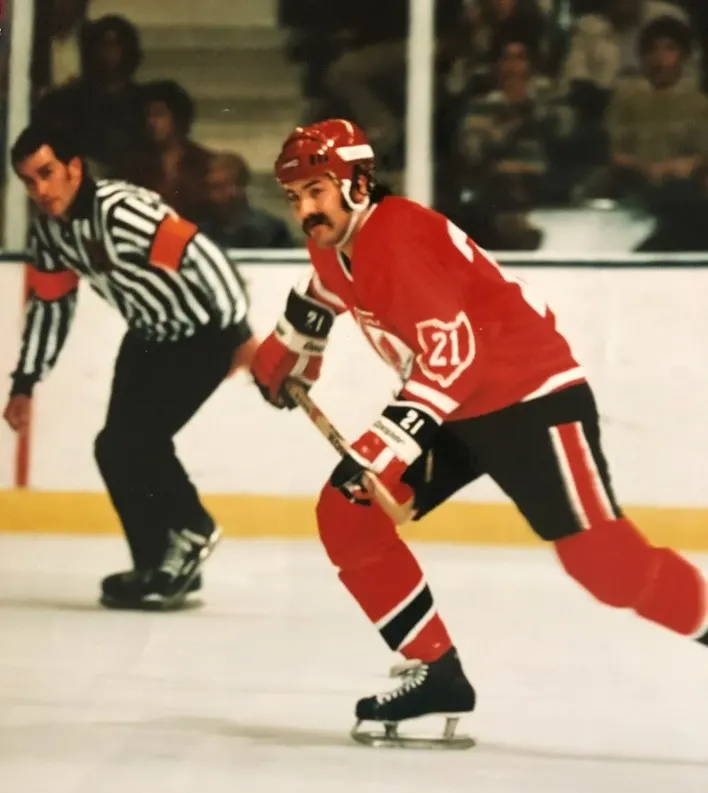Where Are They Now?

Where are they now?
Author/Editor: Jennifer J. Lacelle
Date : February 22, 2021
What does it take to play sports professionally? Skill, ability, persistence, and motivation are several factors when it comes to many areas of life, but especially so in professional sports. Sometimes, a player’s size is also a factor.
For NHL legend Dennis Maruk his size and height were obstacles in the eyes of others when it came to being drafted and signed into the NHL. He needed to be persistent in proving himself as an outstanding athlete if he ever had hopes to play in the “big man’s game.”
Maruk started playing hockey when he was eight years old and the sport quickly became a passion for him. He began playing competitively as a young teenager in his hometown of Toronto, Ontario, with the Ontario Hockey Association Junior Division.
Maruk started playing hockey when he was eight years old and it quickly became a passion for him.. At 15, Maruk was traded to the London Knights hockey team in London, Ontario.
This was a difficult move for him, as he had his mind set on playing junior hockey in his hometown of Toronto, Ontario. For some time, he resisted the move to London, but Maruk’s older sister Karen convinced him to take the opportunity.
Moving at such a young age away from family and friends proved difficult for the young Maruk, put he persisted and from 1972 to 1975 had a very successful junior career with the London Knights. During his time with the Knights, Maruk won the Rookie of the Year award, the Red Tilson award for most outstanding player in the OHL and scored an impressive 159 goals.
In 1975 Maruk was drafted by the NHL’s California Golden Seals, however being drafted was no guarantee that Maruk would ultimately play in the NHL.
“There’s no guarantee,” Maruk says. “Even when drafted you didn’t know.” When Maruk and his agent at the time, Boom Boom Geoffrion (Joseph Bernard Geoffrion) spoke with the Golden Seals’ general manager, Maruk was told he would not be playing in the NHL, but rather that he would start his career playing in the minors.
Despite Maruk’s agent urging the Seals to sign him, the general manager stood firm with his decision. Although this was not good news, Boom Boom encouraged the young Maruk to keep playing his best hockey and prove, once more, that he was an exceptional player and worthy of playing in the NHL.
Shortly thereafter, Maruk was brought up from the minors to play with the Golden Seals during an exhibition game. He impressed the Seals’ manager in his first game and scored his first NHL goal playing against star player Marcel Dionne.
After the game, Maruk received the call from Boom Boom that he was being offered a contract to play in the NHL.
This was the beginning of Maruk’s incredible 15-year journey and career with the NHL
This was the beginning of Maruk’s incredible 15-year journey and career with the NHL. He played with a few different teams for the first several years of his career, but his major highlights stand with the Washington Capitals with whom he played for from 1978-83.
With the Washington Capitals Maruk scored 50 goals in the 1980-81 season, and then surpassed this record in the 1981-82 season when he scored 60 goals. This team record with the Capitals was only recently broken by Alex Ovechkin who scored 65 goals in the 2007-08 season. Maruk continues to hold the record with the Washington Capitals for achieving the most points in one season accumulating 136 points in 1981-82.
During this season he was fourth in the league for total points, just behind Wayne Gretzky, Mike Bossy and Peter Stastny. The superb skills Maruk displayed on the ice led him to play in two NHL All-Star Games: the first in 1978 when he played with the Cleveland Barons, and again in 1982 as a Washington Capital.
Playing in the All-Star Games were memorable experiences for him, although he does acknowledge that today’s All-Star games are more interactive with the players and the audience with speed races, hardest slapshot competitions, etc.
Maruk also played hockey internationally during his NHL career. He played for Team Canada winning bronze medals in 1978 and 1982, and the World Championships in 1978, 1979, 1981 and 1983.
Maruk ended his career with the Minnesota North Stars in 1989 whom he played with from 1983-1989. His career ended in 1989 when his kneecap shattered during a game.
Although he healed significantly, he didn’t feel 100% to return to hockey. “I probably could have played a few more years, but I felt it was time to move on,” Maruk says.
As was common for retired NHL hockey players from that era, the ending of his career led to many years of struggling as he had not prepared for post-career life. During his time in the NHL Maruk was told that there would be opportunities available for retirees, but these opportunities rarely presented themselves.
He briefly worked on the business side of the NHL but didn’t feel it was a good fit for him. From there, Maruk held different positions which included teaching hockey to children and adults of all ages in the United States, Canada, and Europe. He has also become involved in charity games and is an active member with the NHL Alumni.
Many in the hockey world were happy to see him back in Canada and welcomed him home. He was often told upon his arrival to Canada that they wondered where he was hiding all those years.
He has since been asked to participate in a multitude of charity games, and now typically plays anywhere between 50-60 games per year with charity organizations such as Easter Seals, Canadian Cancer Society and Special Olympics.
Since 2014 Maruk has also been running a summer hockey school in Huntsville, ON. “It’s lots of fun to give back,” Maruk says. In 2017, he released an autobiography which he co-wrote with Sportsnet’s sportscaster Ken Reid.
The book, Dennis Maruk: The Unforgettable Story of Hockey’s Forgotten 60-Goal Man,talks about the highs and lows of the sport, as well as his life after his hockey career
Maruk explains that parts of the book were difficult to write as they were “personal situations,” but he felt it was important to provide a full picture of his story. He notes that his life hasn’t been all “peaches ‘n cream.”
There is a great deal in his book that pertains to overcoming adversity, such as moving from home at such a young age, how his size affected his NHL prospects, and dealing with anxiety, depression, and addiction.
As it turns out, Maruk’s book hit the shelves in his 60th year, encompassing 60 chapters, and celebrating his 60 goals in the title of his book. The book’s chapters are unlike traditional hockey autobiographies that can be 30-40 pages long. Rather, he chose to make the chapters short, quick reads which helps make the book more interesting and unique.
Maruk’s book has been well-received, and he often brings copies for fans at the charity events he participates in.
Currently, COVID has made participating in these events difficult, but Maruk is hoping to get back into playing charity games and attending alumni events as soon as restrictions are lifted.
